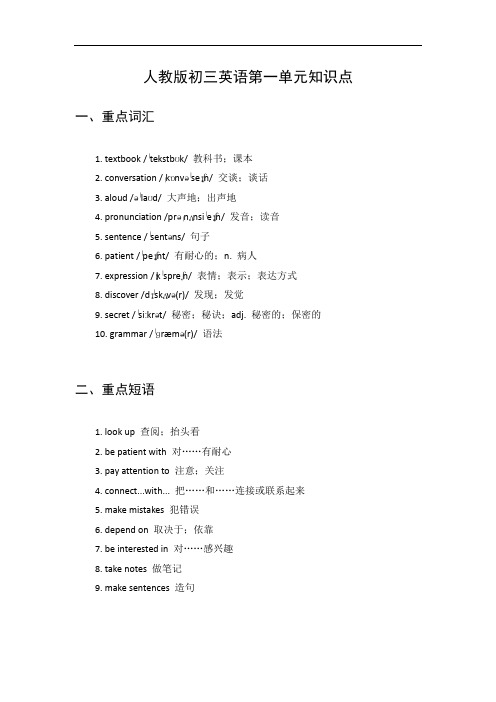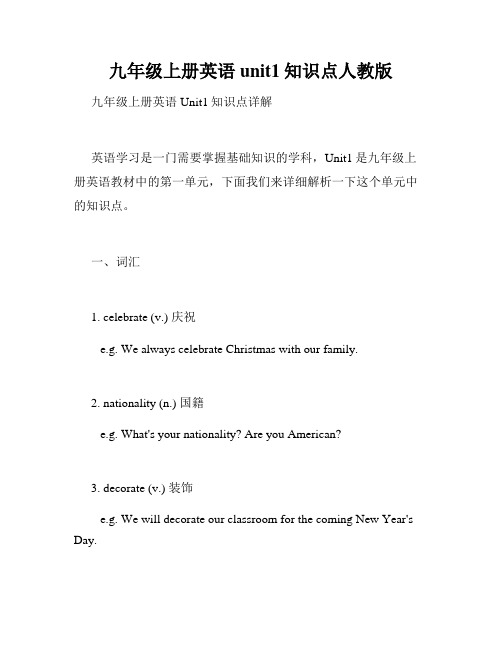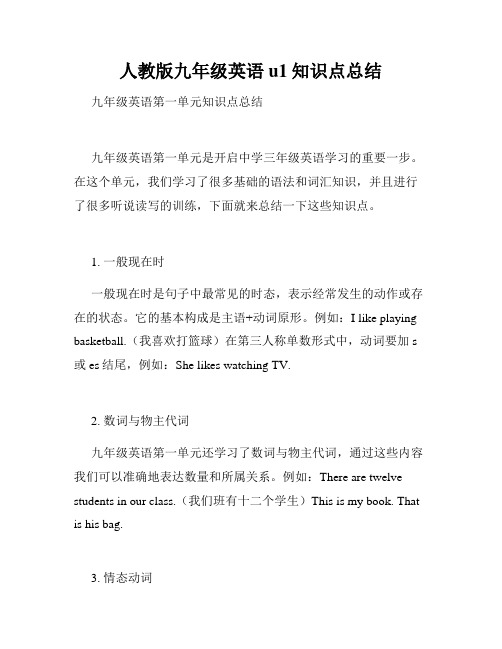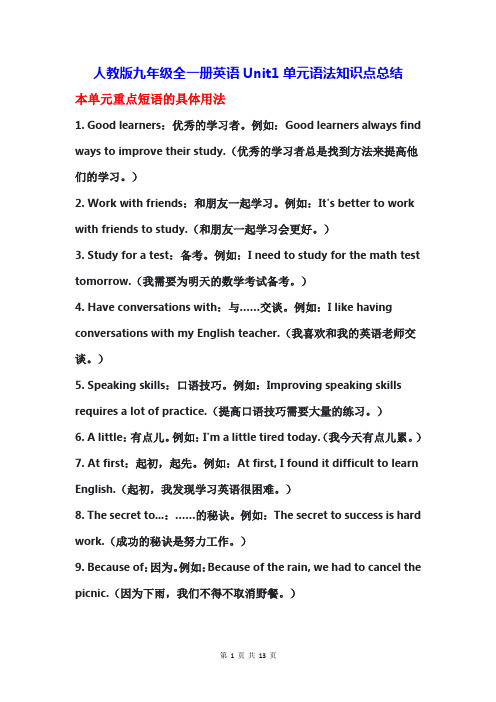人教版九年级英语第一单元知识点总结知识讲解
九年级英语unit1知识点梳理人教版

九年级英语unit1知识点梳理人教版九年级英语Unit 1 知识点梳理九年级英语课程的第一个单元主要涉及到一些基础的语法、词汇和阅读技巧。
本文将对Unit 1的知识点进行梳理和总结,帮助同学们回顾和巩固所学内容。
一、名词的复数形式1. 一般情况下,名词的复数形式是在词尾加s,如books, pens,但也有例外,如:tooth – teeth,foot – feet等。
二、动词的用法1. 动词的过去式:大多数动词的过去式是在词尾加ed,如:talked, played。
但也有一些不规则动词需要记忆,如:go – went,buy – bought等。
三、形容词的比较级和最高级1. 形容词的比较级:在形容词前加er,如:bigger, faster;在形容词前加more,如:more beautiful, more interesting。
四、连接词的用法1. and:表示并列关系,连接两个相同级别的词、短语或句子,如:I like apples and oranges.2. but:表示转折关系,连接两个相反或对比的词、短语或句子,如:I want to go swimming, but it's raining.3. or:表示选择关系,连接两个可替换的词、短语或句子,如:Do you want tea or coffee?4. so:表示因果关系,连接原因和结果,如:He studied hard,so he passed the exam.5. because:表示原因关系,连接原因和结果,如:I stayed at home because it was raining.五、阅读技巧1. 阅读理解题:在阅读理解题中,要仔细阅读文章,理解文章的大意和细节,然后根据题目要求选择正确的答案。
2. 短文填空题:在短文填空题中,要根据短文的语境和逻辑关系,选择适当的单词或短语填入空格中,使短文通顺和完整。
人教版初三英语第一单元知识点

人教版初三英语第一单元知识点一、重点词汇1. textbook /ˈtekstbʊk/ 教科书;课本2. conversation /ˌkɒnvəˈseɪʃn/ 交谈;谈话3. aloud /əˈlaʊd/ 大声地;出声地4. pronunciation /prəˌnʌnsiˈeɪʃn/ 发音;读音5. sentence /ˈsentəns/ 句子6. patient /ˈpeɪʃnt/ 有耐心的;n. 病人7. expression /ɪkˈspreʃn/ 表情;表示;表达方式8. discover /dɪˈskʌvə(r)/ 发现;发觉9. secret /ˈsiːkrət/ 秘密;秘诀;adj. 秘密的;保密的10. grammar /ˈɡræmə(r)/ 语法二、重点短语1. look up 查阅;抬头看2. be patient with 对……有耐心3. pay attention to 注意;关注4. connect...with... 把……和……连接或联系起来5. make mistakes 犯错误6. depend on 取决于;依靠7. be interested in 对……感兴趣8. take notes 做笔记9. make sentences 造句三、重点句型1. —How do you study for a test? 你是怎样为考试而学习的?—I study by working with a group. 我通过和小组一起学习。
2. It's too hard to understand spoken English. 听懂英语口语太难了。
3. The more you read, the faster you'll be. 你读得越多,你就会读得越快。
4. Why did Wei Fen find it difficult to learn English? 为什么魏芬觉得学英语很难?5. I was afraid to ask questions because of my poor pronunciation. 因为我的发音不好,我害怕问问题。
九年级上册英语unit1知识点人教版

九年级上册英语unit1知识点人教版九年级上册英语Unit1知识点详解英语学习是一门需要掌握基础知识的学科,Unit1是九年级上册英语教材中的第一单元,下面我们来详细解析一下这个单元中的知识点。
一、词汇1. celebrate (v.) 庆祝e.g. We always celebrate Christmas with our family.2. nationality (n.) 国籍e.g. What's your nationality? Are you American?3. decorate (v.) 装饰e.g. We will decorate our classroom for the coming New Year's Day.4. foreign (adj.) 外国的e.g. She wants to travel to a foreign country this summer vacation.这些词汇是本单元的重点,通过学习这些词汇能够帮助我们更好地理解和运用单元中的内容。
二、语法本单元主要涉及两个语法点:一是第三人称单数的一般现在时,二是被动语态。
1. 第三人称单数的一般现在时在单数第三人称主语中,动词要加-s或-es。
例如:- She goes to school by bus every day.- He often watches TV in the evening.2. 被动语态被动语态由“be + 过去分词”构成,用于强调动作的承受者而不是执行者。
例如:- The book is written by a famous author.- The car was driven by John.对于这两个语法点,我们需要理解并熟练掌握其用法和构造,通过大量的练习来加深记忆和理解。
三、阅读理解Unit1还包括了一篇关于国际学校的阅读理解,这是对所学知识的运用和理解。
九年级上册英语笔记第一单元人教版

九年级上册英语笔记第一单元人教版九年级上册英语第一单元笔记(人教版)一、重点单词。
1. textbook.- 名词,意为“教科书;课本”。
例如:Our textbooks are very useful for our study.(我们的课本对我们的学习非常有用。
)2. conversation.- 名词,“交谈;谈话”。
常用搭配:have a conversation with sb.(与某人交谈)。
例如:I had a long conversation with my teacher yesterday.(我昨天和我的老师进行了一次长谈。
)3. aloud.- 副词,“大声地;出声地”。
它和loudly的区别在于:aloud侧重于让人能听到,没有“喧闹”的意思;loudly侧重声音喧闹、嘈杂。
例如:Please read the text aloud.(请大声朗读课文。
)4. pronunciation.- 名词,“发音;读音”。
例如:His pronunciation is very good.(他的发音很好。
)5. sentence.- 名词,“句子”。
例如:Make a sentence with this word.(用这个单词造一个句子。
)6. patient.- 形容词,“有耐心的”;名词,“病人”。
例如:Our English teacher is very patient with us.(我们的英语老师对我们非常有耐心。
)- be patient with sb.(对某人有耐心)7. secret.- 名词,“秘密;秘诀”;形容词,“秘密的;保密的”。
例如:It's a secret between us.(这是我们之间的秘密。
)8. look up.- 动词短语,“(在词典、参考书中或通过电脑)查阅;抬头看”。
例如:If you don't know this word, you can look it up in the dictionary.(如果你不知道这个单词,你可以在词典里查阅它。
人教版九年级英语u1知识点总结

人教版九年级英语u1知识点总结九年级英语第一单元知识点总结九年级英语第一单元是开启中学三年级英语学习的重要一步。
在这个单元,我们学习了很多基础的语法和词汇知识,并且进行了很多听说读写的训练,下面就来总结一下这些知识点。
1. 一般现在时一般现在时是句子中最常见的时态,表示经常发生的动作或存在的状态。
它的基本构成是主语+动词原形。
例如:I like playing basketball.(我喜欢打篮球)在第三人称单数形式中,动词要加s 或es结尾,例如:She likes watching TV.2. 数词与物主代词九年级英语第一单元还学习了数词与物主代词,通过这些内容我们可以准确地表达数量和所属关系。
例如:There are twelve students in our class.(我们班有十二个学生)This is my book. That is his bag.3. 情态动词情态动词在句子中表示某种特殊的意义或情感色彩。
我们在这一单元学习了can, could, may以及must的用法。
例如:You can go now.(你现在可以走了)She must study harder.(她必须更加努力学习)4. 祈使句祈使句是用来表达命令、请求、建议等意思的句子,一般使用动词原形。
例如:Open the window, please.(请打开窗户)Don't talk in class.(不要在课堂上说话)5. 一般过去时一般过去时表示过去发生的动作或存在的状态。
它的基本构成是主语+动词过去式。
例如:I visited my grandparents last weekend.(我上个周末去看望了我的祖父母)6. 状语从句状语从句是句子中用来修饰动作的从句,常用的引导词有when, before, after, while等。
例如:We went to the park when it stopped raining.(下雨停了的时候我们去了公园)7. 定语从句定语从句是用来修饰名词或代词的从句,常用的引导词有who, whose, whom, which等。
人教版九年级全一册英语Unit1单元语法知识点总结

人教版九年级全一册英语Unit1单元语法知识点总结本单元重点短语的具体用法1. Good learners:优秀的学习者。
例如:Good learners always find ways to improve their study.(优秀的学习者总是找到方法来提高他们的学习。
)2. Work with friends:和朋友一起学习。
例如:It's better to work with friends to study.(和朋友一起学习会更好。
)3. Study for a test:备考。
例如:I need to study for the math test tomorrow.(我需要为明天的数学考试备考。
)4. Have conversations with:与……交谈。
例如:I like having conversations with my English teacher.(我喜欢和我的英语老师交谈。
)5. Speaking skills:口语技巧。
例如:Improving speaking skills requires a lot of practice.(提高口语技巧需要大量的练习。
)6. A little:有点儿。
例如:I'm a little tired today.(我今天有点儿累。
)7. At first:起初,起先。
例如:At first, I found it difficult to learn English.(起初,我发现学习英语很困难。
)8. The secret to...:……的秘诀。
例如:The secret to success is hard work.(成功的秘诀是努力工作。
)9. Because of:因为。
例如:Because of the rain, we had to cancel the picnic.(因为下雨,我们不得不取消野餐。
九年级英语unit1知识点人教版
九年级英语unit1知识点人教版九年级英语 Unit 1 知识点介绍作为九年级英语的第一个单元,Unit 1 是学生们开始复习和巩固初中英语基础知识的重要阶段。
本单元主要介绍了一些基本的语法和词汇知识,并通过实际的例子和练习帮助学生们理解和掌握这些知识点。
以下将重点介绍本单元的几个重要知识点。
一、现在进行时现在进行时表示说话人目前正在进行或发生的动作。
它的结构是 be 动词(am, is, are)+ 动词的 ing 形式。
例如:I am playing basketball.(我正在打篮球。
)现在进行时的用法有以下几个方面:1. 表示说话人此时正在进行的动作,如:She is reading a book.(她正在看书。
)2. 表示按计划将来要进行的动作,如:I'm meeting my friends after school.(放学后我要和我的朋友们见面。
)3. 表示现阶段临时的状况或现阶段正在发生的事情,如:He is studying in Australia these days.(他这些天正在澳大利亚学习。
)二、形容词和副词的比较级和最高级形容词有比较级和最高级两种形式。
通常在两个人或物之间进行比较时使用。
形容词比较级的构成是在词尾加 -er,最高级的构成是在词尾加-est。
如果形容词以字母 e 结尾,只需加 r 或 st。
例如:big - bigger - biggest(大 - 更大 - 最大)副词的比较级和最高级的构成与形容词相同,只需在词尾加上-er 或 -est。
例如:fast - faster - fastest(快 - 更快 - 最快)形容词和副词的比较级和最高级的用法上一般遵循以下几个规则:1. 一般短词用 er 或 est,如:tall - taller - tallest(高 - 更高 - 最高)2. 以字母 e 结尾的词只加 r 或 st,如:large - larger - largest(大- 更大 - 最大)3. 以辅音字母加 y 结尾的双音节词,变 y 为 i 后再加 er 或 est,如:happy - happier - happiest(快乐 - 更快乐 - 最快乐)三、否定句和疑问句的构成在英语中,构成否定句和疑问句需要使用助动词 do 或 does,do 用于一般现在时的句子,does 用于第三人称单数。
人教版九年级英语全册各单元知识点总结
九年级英语全册各单元知识点总结Unit 1 How can we become good learners?一、短语:1.have conversation with sb. 同某人谈话2.connect …with… 把…和…连接/联系起来3.the secret to… ……的秘诀4.be afraid of doing sth./to do sth. 害怕做某事5.look up 查阅6.repeat out loud 大声跟读7.make mistakes in 在……方面犯错误8.get bored 感到厌烦9.be stressed out 焦虑不安的10.pay attention to 注意;关注11.depend on 取决于;依靠12.the ability to do sth. 做某事的能力二、知识点:1. by + doing:通过……方式(by是介词,后面要跟动名词,也就是动词的ing形式);2. a lot:许多,常用于句末;3. aloud, loud与loudly的用法,三个词都与“大声”或“响亮”有关。
①aloud是副词,通常放在动词之后。
②loud可作形容词或副词。
用作副词时,常与speak, talk, laugh等动词连用,多用于比较级,须放在动词之后。
③loudly是副词,与loud同义,有时两者可替换使用,可位于动词之前或之后。
4. not …at all:一点也不,根本不,not经常可以和助动词结合在一起,at all 则放在句尾;5. be / get excited about sth.:对…感到兴奋;6. end up doing sth:终止/结束做某事;end up with sth.:以…结束;7. first of all:首先(这个短语可用在作文中,使得文章有层次);8. make mistakes:犯错make a mistake 犯一个错误;9. laugh at sb.:笑话;取笑(某人)(常见短语)10. take notes:做笔记/记录;11. native speaker 说本国语的人;12. make up:组成、构成;13. deal with:处理、应付;14. perhaps = maybe:也许;15. go by:(时间)过去;16.each other:彼此;17.regard… as … :把…看作为…;18.change… into…:将…变为…;19. with the help of sb. = with one's help 在某人的帮助下(注意介词of和with,容易出题)20. compare … to …:把…比作… compare with 拿…和…作比较;21. instead:代替,用在句末,副词;instead of sth / doing sth:代替,而不是(这个地方考的较多的就是instead of doing sth,也就是说如果of后面跟动词时,要用动名词形式,也就是动词的ing形式)22.Shall we/ I + do sth.? 我们/我…好吗?23. too…to:太…而不能,常用的句型是too+形容词/副词+ to do sth.Unit 2 I think that moon cakes are delicious!一、短语:1. the Lantern Festival 元宵节2. the Dragon Boat Festival 端午节3. the Water Festival 泼水节4. remind sb. of 使某人想起5. eat five meals a day 一天吃五餐6. put on five pounds 体重增加了五磅7. treat sb. with. 用/以……对待某人8. be similar to... 与.......相似9. end up 最终成为/处于10. share sth. with sb. 与……分享……11. as a result结果12. one... the other... (两者中的) 一个…另一个…13. take sb. out for dinner 带某人出去吃饭14. dress up 乔装打扮15. haunted house 鬼屋16. the beginning of new life 新生命的开始二、知识点:1.宾语从句:(三大考点:引导词、时态和语序。
人教版九年级英语Unit1知识点总结
Unit1 How can we become good learners?一、语法点:介词by的用法1. by doing sth. 通过做某事的方式eg: —How can you improve your pronunciation? —By listening to tapes.2. 表示传达、传递的方式或媒介eg:How did you tell him about it, by letter or by e-mail?3. by + 交通工具eg: Every day I go to school by school bus.4. 在……的旁边eg: I’m sitting by the lake.5. 不迟于、在…之前eg: Please come home by 10 p.m.6. 创作eg: I have already read the book by Mo Yan.二、知识点1. by asking the teacher for help①by 介词通过,表示通过某种方式by doing sth. 通过做某事的方式eg: We visited Beijing University by riding bikes last weekend.②与ask相关的短语ask sb. for sth. 向某人要某物eg: He always asks his parents for money.ask sb. about sth. 向某人询问某事eg: Can I ask you about the result of test?ask sb. ( not) to do sth. 要求某人(不)做某事eg: My mother asks me not to play in the street.2. Do you have conversations with friends in English?have conversations with sb. = have a conversation with sb.与某人交谈/谈话make a conversation 编对话3. What about reading aloud to practice pronunciation?①aloud adv. 大声地;出声地eg: We should read English aloud. 我们应该大声读英语②practicev. 练习practice doing sth. 练习做某事eg: They practice speaking English every morning.n. 练习(不可数名词)eg: Students get practice in the English club.4. I’ve learned a lot (in) that way.in this/that way 用这种/那种方式5. Don’t read word by word.①word by word 一个字一个字的eg: He often read English word by word.②和word by word类似的短语有:day by day 一天天地one by one 一个一个地6. Well, be patient. It takes time.patientadj.耐心的①be patient with sb. 对某人有耐心eg: Our teachers are patient with us.②be patient to do sth. 有耐心做某事eg: Teachers should be patient to teach students.n. 病人eg: There are many patients in the hospital.7. The more you read, the faster you’ll be.the+比较级,the+比较级越…… 越……eg: The more you practice, the better you can understand.8. Why did Wei Fen find it difficult to learn English?find it + adj. + (for sb.) + to do sth. 发现做某事(对于某人)是…make it + adj.+ (for sb.) + to do sth. 使(某人)做某事成为…think it + adj. + (for sb.) + to do sth. 认为做某事(对于某人)是…feel it + adj. + (for sb.) + to do sth. 感觉做某事(对于某人)是…eg: Computers make it easier to keep in touch with friends.电脑使我们获得消息更容易了。
人教版英语九年级Unit1知识点总结
掌握本单元33个单词、49个常用短语、17个重点句子、12个常考点。
by介词的功能及by短语的划线提问以及if、unless 等引导的状语从句,what引导的宾语从句,whether 引导的主语从句,that引导的定语从句重点短语1.by doing sth2.by working with a group通过同小组一起学习3.by making word cards通过制作单词卡片4.by listening to tapes通过听录音磁带5.by asking sb for help通过向某人求助6.by watching videos/ English programs通过看录像/英文节目7.by listening to a tape and repeating out loud通过听录音和大声重复朗读8.by having conversations with friends通过和朋友一起会话9.by taking notes, doing exercises and reading a lot通过记笔记、做大量的练习和阅读10.by writing e-mails to my pen pals通过给笔友写电子邮件11.by reading books and newspapers 通过读书看报12.by speaking English with my classmates 通过和同学讲英语13.by memorizing sentence patterns 通过记句型14.by doing grammar exercises 通过做语法练习15.by reading English books/magazines. 通过阅读英文书籍和杂志16.by writing in an English diary 通过写英文日记17.by using an English dictionary 通过用英语字典18.have conversations with sb同某人谈话19.too...to..太...而不能...---so…that…/ enough to do sth 的转换20.give a report作报告21.at first起初22.word by word逐词逐句地23.the secret to language learning 学习语言的秘诀24.be afraid to do sth害怕做某事=be afraid that+宾语从句be afraid of sth / doing sth 害怕…25.an English movie called Toy Story一部名叫《玩具故事》的英文电影26.fall in love with爱上...27.body language肢体语言28.as well也=too ;as well as 如同、和,连接主语时如同with(主谓一致要看前一主语,不能相加)29. a piece of cake小菜一碟;很容易的事30.It serves you right.活该,自作自受31.look up查阅;查找(主考点)32.so that以便;为了33.repeat out loud大声跟读34.sentence patterns句型35.spoken English英语口语36.make mistakes in doing sth 在...方面犯错by mistake 错误地mistake … for …把……误认为……37.the ability to do sth做某事的能力38.depend on视...而定;取决于;依靠39.pay attention to注意;关注40.connect...with... 把...和...连接或联系起来41.get bored感到厌烦42.try to do sth尽力做某事43.be stressed out焦虑不安的44.even if 即使45.think about 考虑;think of 想起;think over仔细考虑46.learn from 向……学习47.something new / interesting 新事物/有趣的东西48.be born with 天生具有49.Practice makes perfect.熟能生巧重点句子必背1.The teacher spoke so quickly that I did not understand hermost of the time.老师讲的如此快以致大部分时间我都理解不了她讲的。
- 1、下载文档前请自行甄别文档内容的完整性,平台不提供额外的编辑、内容补充、找答案等附加服务。
- 2、"仅部分预览"的文档,不可在线预览部分如存在完整性等问题,可反馈申请退款(可完整预览的文档不适用该条件!)。
- 3、如文档侵犯您的权益,请联系客服反馈,我们会尽快为您处理(人工客服工作时间:9:00-18:30)。
9. ①end up doing sth终止做某事,结束做某事如:
The partyended up singing.晚会以唱歌而结束。
②end up with sth.以…结束如:
The partyended up with her singing.晚会以她的歌唱而告终。
他朗读那篇故事给他儿子听。
②loud可作形容词或副词。用作副词时,常与speak, talk,
laugh等动词连用,多用于比较级,须放在动词之后。如:
She told us to speak a little louder.她让我们说大声一点。
③loudly是副词,与loud同义,有时两者可替换使用,但往往
4.学会运用why don't you……?和should来表示建议。
授课内容:
一.重点词汇:
1. differentlyadv. different adj. 2. quick adj. quicklyadv.
3. slow adj. slowlyadv. 4. easy adj. easilyadv.
人教版九年级英语第一单元知识点总结
教学目标:
1.学会运用how来询问做事方式
2.学会运用by+doing的结构表达做事方式
3.掌握specific; memorize; grammar; differently frustrate; frustrating; quickly; add; not at all; excited; end up,pronounce; spoken; slowly; mistake; make mistakes; comma; challenge; solution; native; speaker; make up.等词汇或短语,later on, it doesn’t matter, be afraid of, laugh at, take notes,realize, matter, afraid, complete, secret, term, trouble, fast, learner, impress。
10. help v.帮助helpfuladj.有帮助的
11. sciencen.科学scientistn.科学家
12. happy adj.高兴的unhappy adj.不高兴的
13.disagreementn.不同意见agreementn.同意
disagree v.不同意agree v.同意
二.重点短语、句型其用法:
我非常喜欢牛奶。我一点也不喜欢咖啡。
not经常可以和助动词结合在一起,at all则放在句尾
8.be / get excited about sth.===
be / get excited about doing sth.===
be excited to do sth.对…感兴奋如:
I am / get excitedabout goingto Beijing.===
含有令人讨厌或打扰别人的意思,可位于动词之前或之后。如: He does not talk loudly or laugh loudly in public.
他不当众大声谈笑。
7. not …at all一点也不根本不如:
I like milk very much. I don’tlike coffeeat all.
如:I’mtoo tired to sayanything.我太累了,什么都不想说。
6. aloud, loud与loudly的用法
三个词都与"大声"或"响亮"有关。
①aloud是副词,重点在出声能让人听见,但声音不一定很大,
常用在读书或说话上。通常放在动词之后。aloud没有比较级
形式。如: He read the story aloud to his son.
④Let’s +dosth.如:Let’s go shopping
⑤Shall we/ I +dosth.?如:Shall we/ I go shopping?
4. a lot许多常用于句末如:I eat a lot.我吃了许多。
a lo用
5. too…to太…而不能常用的句型too+adj./adv. + to do sth.
5. friend n.朋友friendshipn.友谊
6. important adj.重要的unimportant不重要的
7. learn v.学习learnern.学习者
8. impress v.使感动impressedadj.感动的
9. pronounce v.发音pronunciationn.发音
10.first of all首先
. to begin with一开始
later on后来、随
11.also也、而且(用于肯定句)常在句子的中间
①What/ how about +doingsth.?
如:What/ How about going shopping?
②Why don’t you +dosth.?如:Why don’t you go shopping?
③Why not +dosth. ?如:Why not go shopping?
The student went to park by bus.
2.talk about谈论,议论,讨论如:The students often talk about movie after class.学生们常常在课后讨论电影。
talk to sb. === talk with sb.与某人说话
3.提建议的句子:
1.by + doing通过……方式如:bystudyingwith a group
by还可以表示:“在…旁”、“靠近”、“在…期间”、“用、”
“经过”、“乘车”等
如:I live by the river.
I have to go back by ten o’clock.
The thief entered the room by the window.
